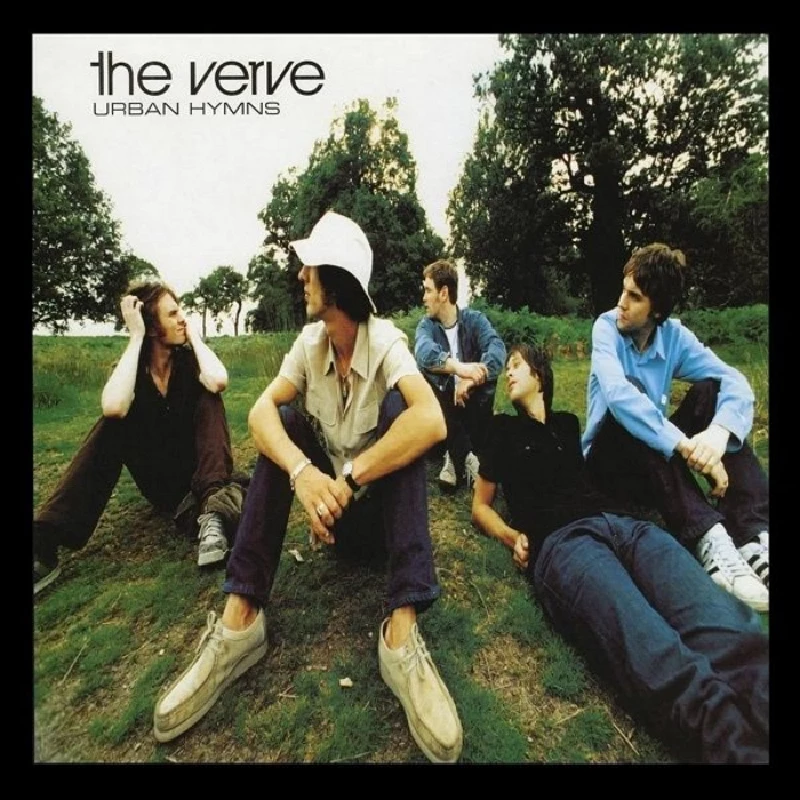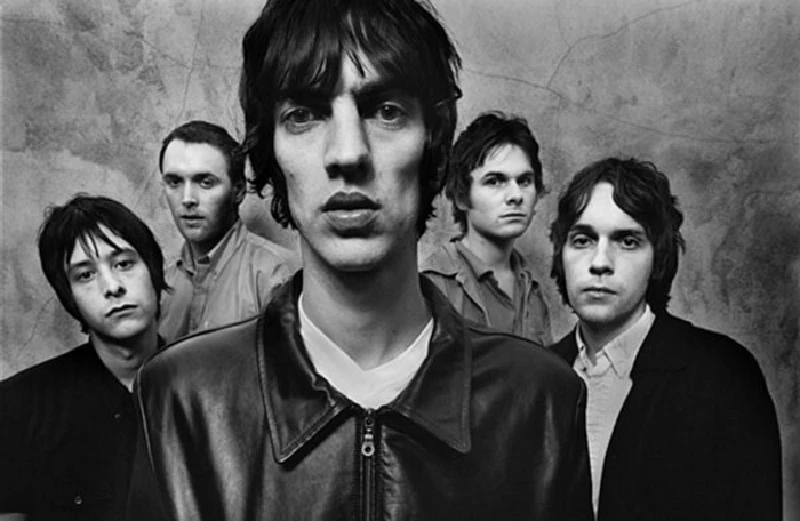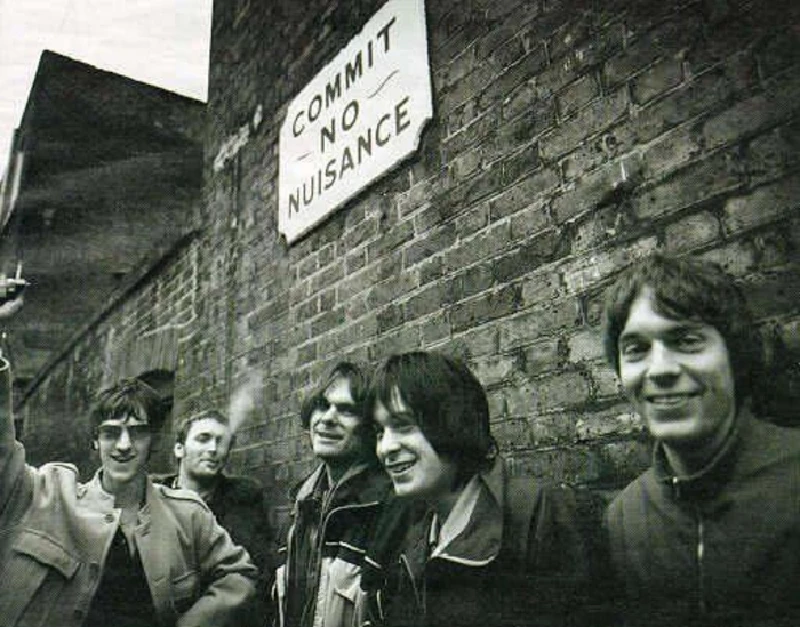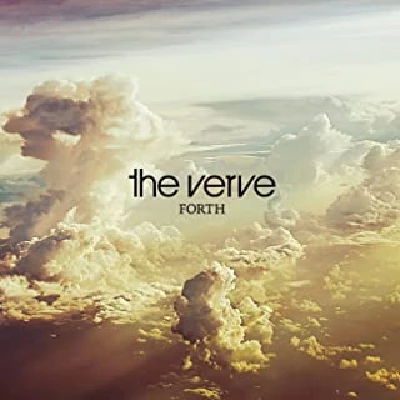Verve - Urban Hymns
by Richard Lewis
published: 31 / 10 / 2017

Label:
Select Label
Format: N/A
intro
In our 'Re:View' section, Richard Lewis explains why British band, The Verve, is considered one of the seminal bands of the late 1990s and early 2000s due to 1997 Platinum album, 'Urban Hymns', which has just been reissued in an expanded 5 CD with DVD box set
If the story of British music in the 1990s is one of bands who were previously part of the underground suddenly becoming bona fide pop stars, The Verve are no exception. ‘Urban Hymns’, the group’s third LP amassed sales figures at home and abroad so vast it saw its creators very briefly become the biggest band on the planet and effectively define the late 1990s and early 2000s. Reissued as an expanded super deluxe 5-CD with DVD package, ‘Urban Hymns’ was originally released in late September 1997 as the Britpop movement was beginning to pall. An instant success, the LP saw the group catapulted from fringe dwelling purveyors of sublime psychedelic grooves towards a very visible kind of popularity. Cultivating a loyal audience for their colossal, psychedelic/prog rock inspired jams that sprawled and swaggered between 1992-95, singer Richard Ashcroft fronted the group as an androgynous Jagger/Morrison-styled shaman who was christened ‘Mad Richard’ by the music press. ‘Urban Hymns’ has to date been certified eleven times Platinum, a figure well in excess of three million copies in their homeland, a staggering number that ranks it as the UK’s eighteenth highest selling album. Proof of how the band’s popularity had gone supernova, by comparison The Verve’s previous albums ‘A Storm In Heaven’ (1993) and ‘A Northern Soul’ (1995) have sold 100,000 apiece in Britain. Proof of how enormous the UK sales tally for the album is, in a landmark year for British music sold more than their 1997 contemporaries: Spiritualized, ‘Ladies & Gentleman We Are Floating In Space’, Blur, ‘Blur’, Primal Scream, ‘Vanishing Point’, Chemical Brothers, ‘Dig Your Own Hole’, Portishead, ‘Portishead’ and The Prodigy, ‘The Fat of the Land’ combined. Radiohead, the nearest comparison for a UK act in terms of commercial reach and critical praise sold under half the number of copies domestically of their creative and commercial zenith ‘OK Computer’, issued three months previously. The Verve’s closet contemporaries geographically Oasis, who they had toured with in 1993 and had gone on to become the undisputed biggest band in Britain had unveiled their third album ‘Be Here Now’ a month prior to The Verve. While the LP was garlanded with laudatory reviews and astonishing first week’s sales, by Christmas, record buyers’ enthusiasm for the disc had curdled, as the realisation that the LP was vastly inferior to its two predecessors had set in. While sales of Oasis’ grand folly had stalled by January 1998 at a still highly impressive six times platinum, ‘Urban Hymns’ remained unstoppable. Put simply the fellow North Westerners had eclipsed Oasis and stolen their crown as the biggest British band at home and internationally as ‘Urban Hymns’ went on to sell in excess of ten million copies. Alongside the sales, the band’s musical influence was highly visible with a wave of upcoming UK bands, Travis, Embrace, Snow Patrol, the long-forgotten Geneva, and to a lesser extent Coldplay, all taking cues from ‘Urban Hymns’ combination of stately ballads and plush string arrangements. The shadow cast by the LP on the careers of the band members meanwhile can be gauged by former lead singer Richard Ashcroft’s recent live dates, where each show featured six to seven cuts from the present LP. A band breaking through commercially on their third album to huge success sounds like the ideal trajectory for a group, after building an audience with their first two LPs. The path to making The Verve’s third album was anything but straightforward however. Following the promotional duties for previous album, ‘A Northern Soul’ (1995) whose pared-down blues rock roar is arguably the outfit’s most perfectly realised disc, The Verve had abruptly disbanded. While it seemed that the band had ceased operations entirely, accounts later suggested Ashcroft had effectively maneuvered guitarist Nick McCabe out of the group, something the guitarist referred to as being ‘fired’. The chief architect of the band’s swirling psychedelia, as an innovator his groundbreaking contributions to The Verve arguably place him ahead even of Radiohead’s Jonny Greenwood, Blur’s Graham Coxon and Suede’s Bernard Butler as the best British guitarist of his generation. With McCabe absent, the remaining trio of Richard Ashcroft, vocals, Simon Jones, bass and Pete Salisbury, drums began to search for a new lead guitarist, with Bernard Butler, who had left Suede some 18 months previously, invited into the fold. Butler only remained for a few days however and after an invitation to former Stone Roses guitarist John Squire foundered, the band recruited Simon Tong. A school friend from Up Holland High, Tong had been in the band prior to McCabe who was later recruited at Winstanley Sixth Form College. With Tong in place on rhythm guitar and keyboards, the quartet still lacked a lead guitarist and Ashcroft in his words ‘bottled it’ and contacted McCabe on New Year’s Day 1997, asking him to re-join the band. Flagged up by lead single ‘Bitter Sweet Symphony’ and backed with its now iconic video of Richard Ashcroft striding down Hoxton High Street and letting no one get in his way, the track now surely stands as of the most famous songs of the past two decades. Created initially on an acoustic guitar, the track featured a sample from ‘The Last Time’ from an album of orchestral versions of songs by The Rolling Stones, a disc bassist Simon Jones had picked up in an Oxfam shop for 50p. Once it became apparent how successful the single was the band incurred the wrath of The Stones’ notorious former manager Allen Klein. Despite getting sample clearance for use of the song, Klein stated that The Verve had used too much of the agreed portion and were now facing a plagiarism lawsuit. As credited sole writer, Ashcroft had to sell his publishing to Klein’s company ABKCO for $1,000. Since Klein had full ownership of the Jagger/Richards songwriting catalogue from 1964-71 (something he had ‘engineered’ in 1965), the New Yorker could now claim 100% of the royalties personally and set about licencing the track to just about any company that came knocking including Nike and Vauxhall Motors. Released to outstanding praise and landing near to or at the summit of the Year End lists, ‘Urban Hymns’ was considered by many a masterpiece. Despite the vast sales and the glowing critical praise however, long standing fans felt slightly disappointed, a common complaint being that the band’s stratospheric psychedelia had been supplanted with something far more prosaic and straightforward. Although the guitarist had rejoined the group and adding his parts to already existing completed songs, many felt that Nick McCabe wasn’t permitted enough of a free hand on the LP, a longstanding criticism that had been levelled by some malcontents even at the band’s debut album following a run of superlative singles. Where early landmarks ‘Gravity Grave’, ‘Feel’ and ‘She’s A Superstar’ almost dispensed entirely with the pop songwriting handbook, here tracks for the most part cleaved towards straightforward verse-chorus-verse formats, while free form jam exercises such as ‘Brainstorm Interlude’ and ‘(Reprise)’ from ‘A Northern Soul’ were conspicuously absent. The presence of strings on several tracks, while entirely fitting on 'Urban Hymns' signals the beginning of something that was to become a bugbear with Ashcroft’s solo material as his songs became swamped with them. ‘See You In The Next One (Have A Good Time)’, the concluding track from ‘A Storm In Heaven’ was Ashcroft’s first solo composition. Two of the three singles from ‘A Northern Soul’, William Blake inspired ballad ‘History’, (its string section reportedly influenced by Oasis’ 1994 single ‘Whatever’) and the similarly bleak but beautiful ‘On Your Own’ were also both written primarily by the singer. This pair of tracks provided an insight into how the next album would sound, as the acoustic guitar powered cuts moved The Verve firmly away from their psychedelic space rock incarnation into something far more conventional. One of the most contentious subjects amongst any group, song authorship and the monies associated with it is an area that has caused disputes amongst countless bands. In a recent interview with Drowned In Sound, Nick McCabe disputed that the bulk of ‘Urban Hymn’s' was written by Ashcroft alone. ‘It wasn't that much different from the processes that went into the earlier records. We all developed ideas on the spot and things happened additively. The same thing happened with Urban Hymns’,' the guitarist stated. ‘A lot of those tracks bear his name because we had a manager (powerful industry figure, Jazz Summers) who encouraged that line of thinking at the time’. More in line with their earlier work, ‘The Rolling People’ attributed to the whole band was strongly influenced by ‘666’, the 1972 album by Greek prog rockers Aphrodite’s Child which featured future film composer Vangelis in their ranks. Filching the title from a lyric in the song ‘Altamont’, The Verve lifted a riff from ‘The Four Horsemen’ that became the closing chorus of the track. 'Glimmers of the Wigan,' Stargazers' earlier approach can also be heard in group composition ‘Catching the Butterfly’, a thirty-minute jam Ashcroft edited down into an atmospheric psych rock cut redolent of their earlier work and a sequel of sorts to ‘Butterfly’ from ‘A Storm In Heaven’. Much of ‘Urban Hymns’ was written initially by Ashcroft while renting a flat in Bath, while the remainder of the band moved to London. The rough demos the singer created were recognised by the group’s label boss at Virgin Records, Dave Boyd, as having massive commercial potential. Brian Cannon, The Verve’s sleeve designer, recalled of the writing sessions in March 1998 edition of Select ‘It was the most creative period Richard had ever had. There was no fighting or tension. All he had to do was get the songs together’. As the singer had, in one of his own lyrics achieved ‘Happiness, more or less,’ it was no surprise that the songs in ‘Urban Hymns’ for the most part inhabited a far more relaxed place than the emotionally racked lyric sheets of ‘A Northern Soul’. In place of lyrics such as ‘I'm just a poor little wifeless fella/Another drink and I won't miss her’ (‘So It Goes’) and ‘I’m gonna die alone in bed’ (‘A Northern Soul’) came songs that reflected a far more settled state of mind. The reason for this newfound contentment was Ashcroft’s marriage to Kate Radley in July 1995. While the union was kept from the press for several years, Radley was keyboard player for space rock troupe, Spiritualized, and was the former girlfriend of band leader Jason Pierce. Given that both groups had shared tour and festival bills for several years, the situation became further complicated. In the pre-Internet, gossip website era, none of this information was known beyond the parties involved, unsurprising given Ashcroft’s and the band’s dislike of ‘celebrity’ in general. With the release of Spiritualized’s 1997 masterwork ‘Ladies & Gentlemen, We Are Floating In Space’ whose lyrics dissected the breakdown of Pierce and Radley’s relationship and featured vocal and keyboard parts already recorded by Radley, the music press avidly began covering the ‘love triangle’ between the three, unaware that Ashcroft and Radley had already been married for two years. Amongst the calmer waters of his domestic life, Ashcroft’s lyrics for ‘Urban Hymns’ still retained their depth however, ‘The Drugs Don’t Work’, one of Ashcroft’s fulcrum moments as a writer, tackled the death of his father when he was just eleven- years-old and was unbelievably moving. Elsewhere the oft-overlooked ‘Weeping Willow’ combined lyrical steeliness (‘The pills under my pillow/The Gun under your pillow’) and swooning slide guitar textures. Often overlooked rhythm guitarist/keys player Simon Tong, is an under-appreciated presence on the LP, his skills later earning him a place in Gorillaz and Damon Albarn’s The Good, The Bad and The Queen supergroup. Peter Salisbury’s faultlessly crisp beats and offbeat accents mark him out as a sticksman vastly superior to many of his contemporaries. Simon Jones meanwhile, surely one of the most underrated bassists of his era, propels ‘Come On’ and ‘Catching the Butterfly’ with powerful, imaginative basslines. While the improvements on most remastered albums are almost imperceptible, the present redux courtesy of co-producer Chris Potter imbues the disc with added gloss and rhythm section punch that becomes apparent when ‘Bitter Sweet Symphony’ comes into full bloom 45 seconds in. Due to ‘Urban Hymns’ ubiquity on the radio (‘The Drugs Don’t Work racked up an astonishing 1,200 plays in one week), the album was the first Verve LP purchased by the vast majority of its buyers, a vastly different beast to the ethereal psych of only four years previously. Elegantly restrained ballad ‘Sonnet’, which the band only sanctioned to be issued as the album’s fourth single, as a chart ineligible 12” single in March 1998 boosted the album’s sales yet further through heavy radio play into the new year. The sense that the band’s singer and the guitarist were in completely differnt headspaces meanwhile is proven by ‘Neon Wilderness’, a vista of atmospheric guitar pedal work credited to McCabe/The Verve which baffled new arrivals to the group. Following the sonic curveball of ‘Neon Wilderness’, during the album’s second half, Ashcroft comes to the fore. The band make themselves felt as the resolutely straightforward but melodically rich likes of ‘Space and Time’, is given an edge by McCabe’s gliding shoegaze textures and roaring chords during the chorus. Ashcroft hadn’t entirely lost his edginess as the ‘This is a big… Fuck You/This is a big… Fuck You’ taunt at the conclusion of Led Zeppelin-esque juggernaut ‘Come On’ proves. That said, the feeling remains that if the LP had skipped straight from track nine to track twelve, passing directly from ‘Lucky Man’ to ‘Come On’, it would have been better for it. If the plodding ‘One Day’, the lightweight indie pop of ‘This Time’ and a ballad too far ‘Velvet Morning’ were jettisoned from the tracklist the album would have been stronger for its shorter running time. Moving on to the additional features in the lavish box set, in addition to the B-sides and the live disc, where the package really scores is on the visuals, with the DVD the most likely element to tempt long term fans. ‘The Video 96-98’ available for the first time on DVD combining the album promos, US tour film, backstage and studio footage and interviews is an excellent primer for the era. Alongside the alternative versions of the music videos, are four tracks from BBC2’s ‘Later… With Jools Holland’ which is simply breathtaking, with ‘Life’s An Ocean’ in particular an absolute marvel. Showcasing The Verve at the apex of their fame, the quintet’s legendary homecoming gig in May 1998 in the grounds of Haigh Hall is here presented for the first time in its entirety. The concert held on the outskirts of Wigan really did see the band as the lyric from ‘This Is Music’ goes ‘Stood at the top of the hill over my town’, as the 33,000 tickets available sold out within an hour, a formidable achievement in the pre-online ticketing era. Playing ‘Urban Hymns’ in its entirety with exception of ‘This Time’, standout moments from the show include a McCabe tour de force on ‘Catching the Butterfly’ and a barnstorming take on ‘The Rolling People’ which provokes an outbreak of mass pogoing, before developing into a full-on space rock jam. Fame hadn’t filed down Ashcroft’s spikier onstage tendencies meanwhile, with his pronouncement ‘This is live on the BBC, no swearing Motherfucker!’ and ‘Don't buy Vauxhall cars, they're shit!’ in reference to Allen Klein’s entirely predictable money grubbing mentioned earlier, edited out of the current edition. Elsewhere a slight Ashcroft made during the intro to ‘History’ towards former girlfriend Sarah Carpenter, who had supposedly inspired the lyrics, is understandably absent: ‘Despite what you think, this isn't about you. You know who you are, you snide fucker. This song’s about love and peace’. In spite of its huge success creatively and commercially, the show was to be the band’s last with McCabe, a sure sign that things were going seriously wrong behind the scenes. Recruiting veteran pedal steel sessioner BJ Cole and utilizing samples and triggers of McCabe’s parts, the band resumed touring a few months later, a series of dates the ‘NME’ later called ‘A McCabe-free fiasco’. Evidence that relationships in the band were fracturing at the time of Haigh Hall can be seen, as Ashcroft and Jones clearly enjoy a strong rapport, lead singer and lead guitarist avoid eye contact completely. While completists might grumble that the supplementary features including all of the accompanying B-sides are already available, the opportunity to collect all of them in one place makes sense and all of the cuts pass muster. A sequel of sorts to ‘Life’s An Ocean’, ‘Country Song’ is an escapee from the ‘Northern Soul’ sessions, a bitter, brilliant McCabe piloted blues, (opening line ‘Dying is easy/It’s what I’m living for’) while ‘Echo Bass’ is a cousin to the cyclical grooves of The Verve’s 1992-3 era. Collecting live material from Washington DC, Brixton and Manchester, the fifth disc offers proof of how meteoric the album’s success was, as The Verve were playing theatre sized venues for an album that would justify arenas within six months. Satisfyingly, earlier songs are also included, with stellar versions of early standards ‘Slide Away’ and ‘A Man Called Sun’. Elsewhere ‘History’ has its string section rearranged by McCabe into glistening slide guitar figures A band who (in)famously have reams of demos, alternate versions and unreleased tracks in their archives that have yet to see the (official) light of day, frustratingly none of these are included in the box set. Following the release of ‘Urban Hymns’ working versions and material from what was to become Ashcroft’s solo debut ‘Alone With Everybody’ appeared on bootleg album ‘Sympathy For the Demos’, which showcased the band during their McCabe-free era in 1996. A newly unearthed tranche of fully mastered songs appeared on YouTube in early September meanwhile, including the stunning ‘All Ways Are Maybes’, a track strong enough to have been an A-side. Elsewhere among the eight cuts the Kosmiche groove of ‘Wednesday Madness’ and the uncoiling blues motifs of ‘Tina Turner’ hark back to the band’s psychedelic incarnation. Vivid testament to the band’s cutting room floor offerings outstripping scores of other groups, none of the songs are included in this reissue, or ever saw official releases which further underlines the tragedy of the band’s eventual split in April 1999. If ‘On Your Own’ and ‘History’ provided a glimpse into ‘Urban Hymns’, the singles from the present album offer an insight into Ashcroft’s debut solo LP ‘Alone With Everybody’ (2000). A continuation of the chamber pop/mainstream rock sound The Verve had begun to explore, the singer continued in the same vein with added production gloss. Demonstrably successful, scooping a Platinum certification, the disc further alienated old school Verve fans and critics, with Q journalist John Harris who had followed the band from their early days famously lambasting the LP in a two-star write up. The Verve story didn’t end here, of course, as nine years later the original quartet of Ashcroft, McCabe, Jones and Salisbury regrouped. The sporadically brilliant ‘Forth’ (2008) which McCabe has cited as his favourite Verve LP was followed by a rapturously received tour before familiar tensions surfaced and the band splintered, this time irrevocably. Until they inevitably reform again, of course.
Track Listing:-
Band Links:-
https://en.wikipedia.org/wiki/The_Vervehttps://www.facebook.com/theverve/
https://twitter.com/genuineverve
Picture Gallery:-


reviews |
|
Forth (2008) |

|
| Lazy and somewhat formulaic fourth album and first CD in eleven years from the Verve |
| Love is Noise (2008) |
most viewed articles
current edition
Carl Ewens - David Bowie 1964 to 1982 On Track: Every Album, Every SongArmory Show - Interview with Richard Jobson
Bathers - Photoscapes 1
Colin Blunstone - Thalia Hall, Chicago, 16/7/2025
Visor Fest - Valencia, Spain, 26/9/2025...27/9/2025
Billie Eilish - O2 Arena, London, 10/7/2025
Robert Forster - Interview
Loft - Interview
John McKay - Interview
Editorial - July 2025
previous editions
Heavenly - P.U.N.K. Girl EPManic Street Preachers - (Gig of a Lifetime) Millennium Stadium, Cardiff, December 1999
Oasis - Oasis, Earl's Court, London, 1995
Beautiful South - Ten Songs That Made Me Love...
Trudie Myerscough-Harris - Interview
Pixies - Ten Songs That Made Me Love...
Prolapse - Interview
Doris Brendel - Interview
Simon Heavisides - Destiny Stopped Screaming: The Life and Times of Adrian Borland
Paul Clerehugh - Interview
most viewed reviews
current edition
Amy Macdonald - Is This What You've Been Waiting For?Sick Man of Europe - The Sick Man of Europe
Alice Cooper - The Revenge of Alice Cooper
Phew, Erika Kobayashi,, Dieter Moebius - Radium Girls
Davey Woodward - Mumbo in the Jumbo
Lucy Spraggan - Other Sides of the Moon
Blueboy - 2
Cynthia Erivo - I Forgive You
Philip Jeays - Victoria
Lapsley - I'm a Hurricane, I'm a Woman In Love
Pennyblackmusic Regular Contributors
Adrian Janes
Amanda J. Window
Andrew Twambley
Anthony Dhanendran
Benjamin Howarth
Cila Warncke
Daniel Cressey
Darren Aston
Dastardly
Dave Goodwin
Denzil Watson
Dominic B. Simpson
Eoghan Lyng
Fiona Hutchings
Harry Sherriff
Helen Tipping
Jamie Rowland
John Clarkson
Julie Cruickshank
Kimberly Bright
Lisa Torem
Maarten Schiethart